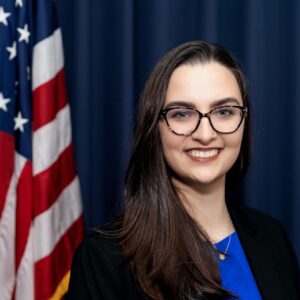Emily Zambrello is a Constituent Engagement Coordinator at Connecticut House Democrats who earned her bachelor’s degree at the University of Connecticut and her master of science at Central Connecticut State University. Here, she shares why she chose to build a life in Connecticut and how she became involved in her community.
 NAN PRICE: Let’s start with a little background. Why Connecticut?
NAN PRICE: Let’s start with a little background. Why Connecticut?
EMILY ZAMBRELLO: I was born and raised in Wethersfield. I went to UConn for college. I lived in Coventry for a few years and then I came back to Wethersfield in 2018 and I’ve been here ever since. I have always really loved this town.
Wethersfield has a long and fascinating history here, being one of the oldest towns in the state. I’m interested in all aspects of Wethersfield and broader Connecticut history, not just the nice parts but also the dark parts that contribute to who we are. That’s one of the reasons I stayed here.
I was on the Historic District Commission for a year and a half, which made me feel even more connected to this town. I like it here and I don’t want to go anywhere else. I’ve built a good life here and made a lot of connections.
The other thing is, I’m a disabled person. I’m also queer and I’m a woman. Connecticut has given me a very clear message that I am welcome here and my contributions are worthy and wanted. I feel very valued by this state. That’s a huge draw and I don’t want to go anywhere else. My options are limited, but this state has worked so hard to make it clear that I can stay here.
NAN: Let’s transition into developing your career here. How did you get from point A to point B?
EMILY: After I graduated from UConn, I worked in the home care industry for a few years. I was a home care scheduler at Masonicare and I briefly worked for their charity foundation. So, I got a pretty significant view on the challenges people experience from both a patient and an administrative perspective.
Eventually I started to reconnect with what I actually went to school to study, which was political science and anthropology. I decided to go back to grad school to get an international studies degree. During my studies, I shifted my focus from international as I realized wanted to be more involved in what’s going on in my community and the issues within our healthcare system.
When I moved back to Weathersfield from Coventry, I started showing up to things. Some local state reps were having a meet and greet and I just went. I started putting myself out there and everyone was wonderful and welcoming.
As soon as I started showing up to things and meeting more people, they wanted me to get involved in more things. Eventually, my involvement became a job with the Bronin Campaign in 2019. And then a few months later, I started working for House Democrats.
So, my interest quickly spiraled into being where I wanted to be because I showed up and people were happy about that. It made me feel welcome and very confident in my decision to stay in this area.
NAN: What would you advise others thinking about getting involved in their community?
EMILY: It depends on what you want to do. For example, I’m very focused on community involvement, particularly the political aspect of things. I’m currently doing a leadership program to work on disability issues. Because I’m disabled, something I want to work on in politics is talking about issues on behalf of people who don’t always get that chance and becoming a visible person everybody knows. I’m also going to be joining the advisory committee for people with disabilities in town.
The key is to find out where people are going to be—if they have meet and greets or networking events—and just show up. You don’t have to have any expectation for yourself besides just showing up and seeing what happens. You have to be willing to put yourself out there. You can’t shy away from those opportunities. It gets easier once you do more of it. That first step can be the most difficult.
And, if you really want to get involved in your town, especially if you’re someone who’s interested in politics, the local democratic and republican town committees are always looking for new members. As long as you’re a registered voter in that party, you can attend their meetings even if you’re not a member, so you can get to know people.
Those are good places to start because the people in those town committees are some of the most involved in town. They know what’s going on at the council, the board of education, or the commissions. They’ll know what direction you need to go to get where you want to be in terms of local involvement.
